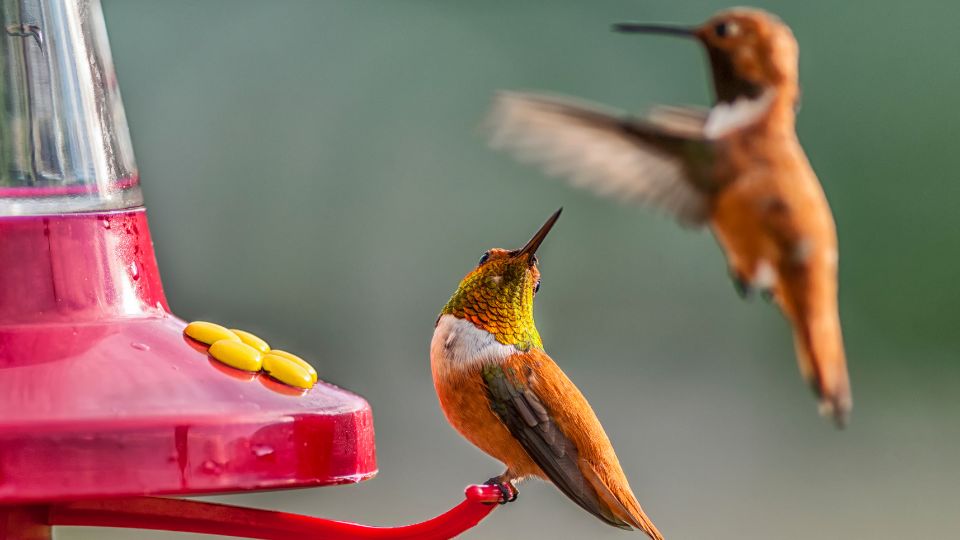If you’re a bird watcher and like having hummingbirds in your yard, you probably want to know whether they can bite you. In general, hummers may be aggressive because they’re territorial. Hummingbird males are more aggressive than females and tend to claim their territory and a few females for courtship and mating. Still, they won’t intentionally hurt you or get aggressive towards you. Here’s how you can safely feed hummingbirds without worrying about whether they will hurt you.
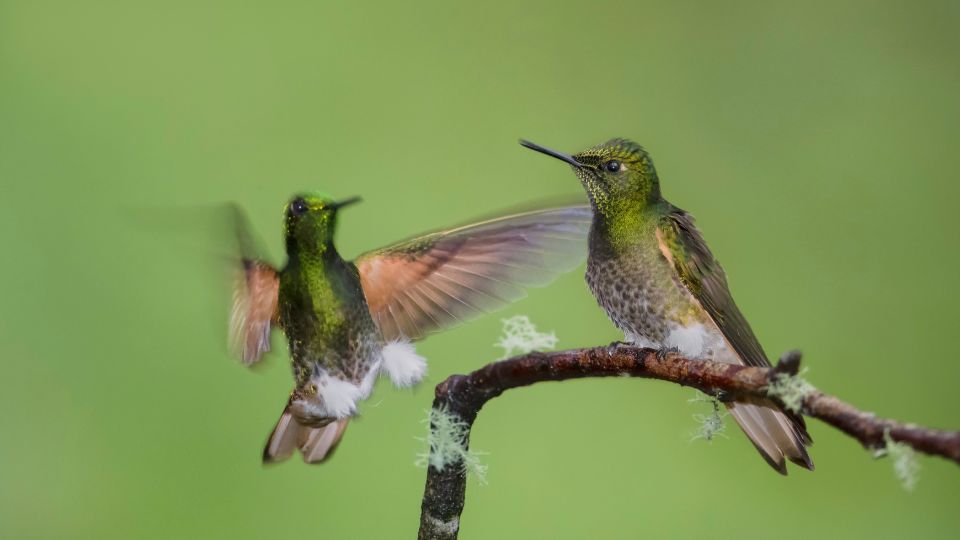
Table of Contents
What Are Hummingbirds Like?
These tiny birds of the Avian species are known for erratic behavior, flying at high-speed around flowers and feeding stations, often acting as pollinators in your backyard. They have small body weights and are rich in various colors that spread around their gorget and upper feathers.
What’s more, hummingbird species are known to be super smart. They have a great memory and know every flower in their territory and how long it will take for that flower to refill its nectar. They keep their memory for about one year and can easily find the feeders in your backyard. Hummingbirds also go into torpor as soon as the temperatures demand it, so you likely won’t see them once it gets colder. Don’t worry; they’re saving energy for later.
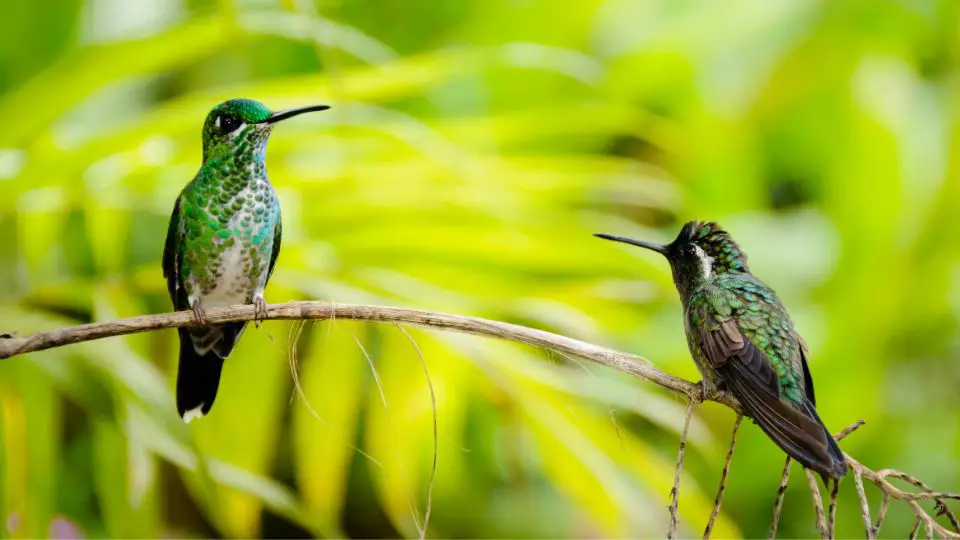
Typical Hummingbird Behavior
In general, hummingbirds aren’t that social. However, they will come together to share their food supply. They don’t migrate in groups and won’t fly together. They love their territory, and male hummingbirds will often aggressively defend it. They select each territory based on food sources, nectar, and water — many being about a quarter acre in size.
Female hummingbirds define territories based on the nests and places they’ll build them. Both male and female hummingbirds will aggressively defend their baby hummingbirds, nests, and areas where they feed. Females will also keep any males away from their nests because their bright colors might lure predators.
Sometimes, they can be so aggressive that they hurt one another. Still, such strong hummingbird attacks are very rare — they’ll usually lose a few feathers in a fight. Place the hummingbird feeders far apart or close together if you want to help your tiny guests keep the peace and avoid hummingbird fights.
You can try moving the feeders around if you see some aggressive behavior. In most cases, you should leave it alone, as hummingbird fights do not escalate to serious injury. These bird species will sort it out on their own.
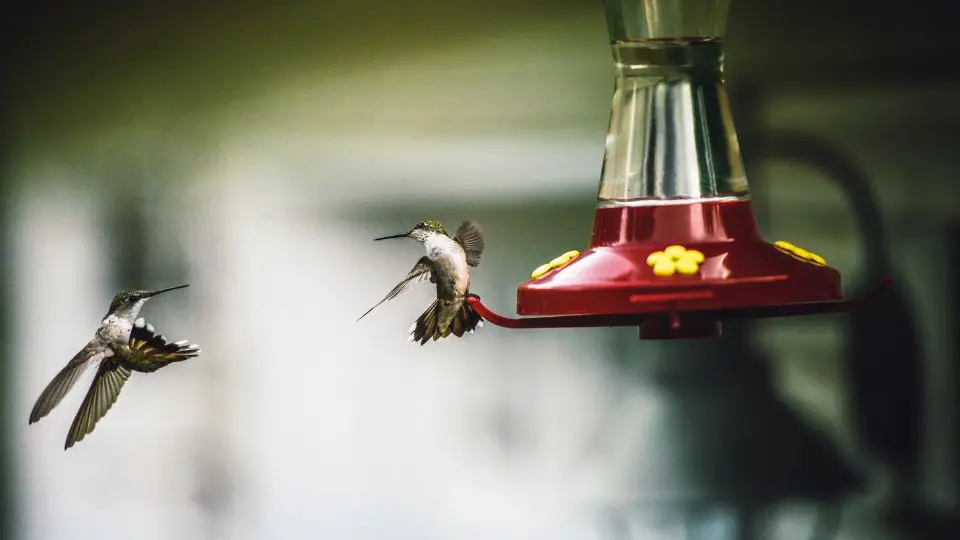
How Can You Tell if a Hummingbird Is Friendly?
Hummingbirds get nosey and are usually a friendly species. They won’t do any harm to you and will happily come to you if they feel safe. You’ll hear them chirping, and they may come together to your hand if you earn their trust. After some time, you may even see a hummingbird land on your finger. If you want to earn their trust, you can:
- keep your pets indoors to create a safe space
- tell your children to observe the birds quietly
- place a chair and sit near the feeding station
- not try to stroke the bird as you can hurt it
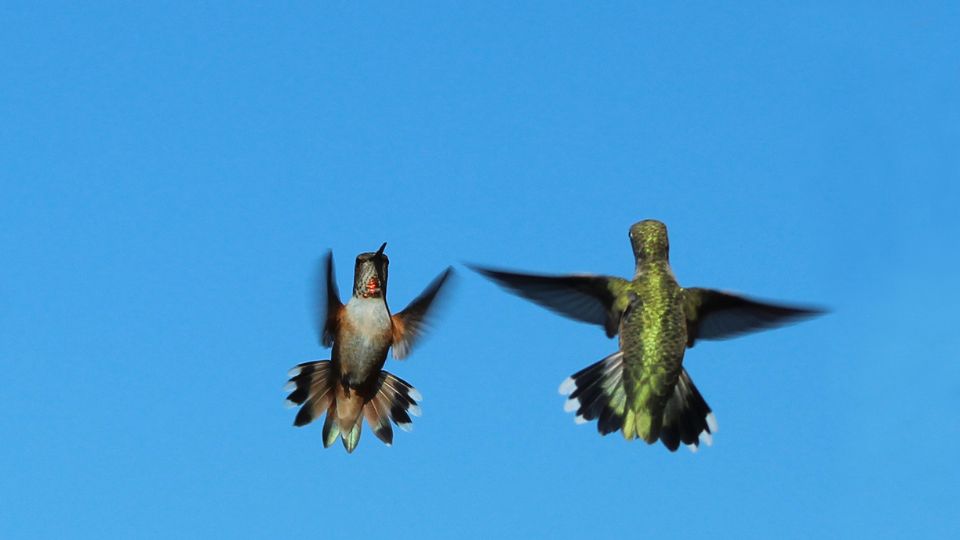
Is It Safe to Get Close to a Hummingbird?
Like it or not, some hummingbirds will fly close to you when you’re out, replacing the sugar water. Don’t worry; the chances of them hurting you are slim. They want to know when they can use the
Even if they wanted to keep you away or let you know you’re the unwanted guest, they don’t have the body weight to hurt you. Moreover, people claim they saw something as small as praying mantises attacking hummingbirds and sometimes even killing them. Hence, it’s safe to say that these small birds aren’t capable of hurting people or other animals.
Is It OK to Touch a Hummingbird?
Nothing is stopping the hummingbird from landing on you and touching you. On the other hand, you should follow the laws — know that it’s illegal to trap, hold, or control hummingbirds without a permit. If you notice a hummingbird is hurt or in distress, you can pick it up and hand-feed it; ensure you let it go quickly.
If you find a hurt baby hummingbird, you should help it as fast as possible. The best possible course of action is to take it to the nearest vet clinic. Know that you won’t catch any disease or get sick if you help a hummingbird survive.
Remember where you found the baby, as the hummingbird nest is likely nearby — you’ll want to try and return the baby there and help the birds maintain a healthy ecosystem in the area.

Reasons Hummingbirds Can Attack
Both male and female hummingbirds can be aggressive with their own kind. Since they’re very territorial, you can see them attacking one another around your backyard. They hate sharing the bird feeder, and if they believe you’re a threat, they’ll give off a warning.
When mating season is trending, make sure to stay away from the nests and young hummingbirds, as females will try to defend them. Unfortunately, you won’t know whether you’re close to the nest until the mom reacts, so pay close attention to the birds’ behavior. Never walk up to a nest, or you’ll disturb the birds.
Signs of Aggressive Hummingbird
While these birds are small, if you pay attention, you can still notice the warning signs:
- aggressive noises — loud, fast chirping and buzzing
- posture — they may make themselves look larger, raise feathers, or spread their wings
- dives — common behavior near feeders; one hummer may suddenly dive among others
- chases — if the intruder stays put, the hummingbird will try to chase it away
- finally, fighting — the most aggressive option and the bird’s last choice in defense
Still, most of these signs are there for other hummers, not you.
The Most Aggressive Types of Hummingbirds
The Ruby-throated hummingbird is known to be the most aggressive kind of hummer around. They’re the most territorial. However, the Ruby-throated kind will still share feeders before the fall migration. Rufous hummingbirds are also known as tough and feisty, especially during the late-spring mating season when they establish their territory.

Do Hummingbirds Have Sharp Teeth?
According to some experts, hummingbirds’ beaks are evolving. Naturally, they’re supposed to be all about collecting nectar, but scientists noticed strange morphologies. Some hummingbirds have developed stiff bills and teeth-like serrations. Still, it’s believed that these changes happened to help the feeding efficiency and not improve fighting.
Do Hummingbirds Bite Humans?
There’s a very small chance a hummingbird will intentionally attack a human. The only way someone could get attacked is if they find themselves between two hummers that fight or near a mother protecting her babies.
What Happens if a Hummingbird Bites You?
On an odd chance you get bitten by a hummingbird, it probably won’t hurt you a lot. You’re too big for the bird to cause any real harm. Still, be mindful of their behavior and beaks, as they can be sharp.
What to Do if Hummingbirds Get Near Your Face?
These birds are naturally curious, and that’s one of the main reasons they’ll fly close to your face. If they often see you replacing their sugar water, they may want to know more about you.
On the other hand, if they don’t see you that often, you’re “a new thing” in their territory, so they’ll want to check you out. They’ll also want to know whether you’re a threat, so they’ll get close to check out.
Can Hummingbirds Recognize You?
If a hummingbird keeps seeing you around, they’ll remember you. By providing a safe environment for the birds, you’ll become their friend, so don’t be surprised if they even enter your home. The best way to gain the trust of these tiny birds you can sit outside with them, provide sugar water, and keep them safe from your pets.
Final Thoughts
Hummingbirds are wonderful beings with colorful feathers and feisty personalities. While they’re often super territorial and fight with each other, you can rest assured they won’t harm you. If you notice them flying around your face, know they want to get to know you better. Set up a feeder, and don’t worry; the chances of them biting and hurting you are close to none.

